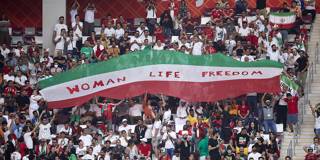The Islamic Republic has been unable to quell the civil unrest that erupted three months ago, after Mahsa Amini died after being detained for violating hijab rules. While the regime has now abolished the morality police, the protesters have broadened their demands.
BLACKSBURG, VIRGINIA – The massive public protests that have raged across Iran since 22-year-old Mahsa Amini died in the custody of the morality police in September arrived at the World Cup. Ahead of its 6-2 loss to England last month, the Iranian team refused to sing the Islamic Republic’s national anthem, with some activists in attendance waving protest signs and booing the team for not quitting the tournament altogether in a show of solidarity toward the hundreds of young Iranians killed during the past ten weeks.

BLACKSBURG, VIRGINIA – The massive public protests that have raged across Iran since 22-year-old Mahsa Amini died in the custody of the morality police in September arrived at the World Cup. Ahead of its 6-2 loss to England last month, the Iranian team refused to sing the Islamic Republic’s national anthem, with some activists in attendance waving protest signs and booing the team for not quitting the tournament altogether in a show of solidarity toward the hundreds of young Iranians killed during the past ten weeks.